

Fugue state. Dissociative disorder Dissociative fugue, formerly fugue state or psychogenic fugue, is a dissociative disorder[1] and a rare psychiatric disorder characterized by reversible amnesia for personal identity, including the memories, personality, and other identifying characteristics of individuality.

The state can last days, months or longer. Schizophrenia may be the price of our humanity. Plenty of us have known a dog on Prozac.
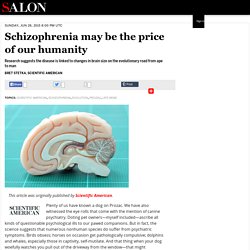
We have also witnessed the eye rolls that come with the mention of canine psychiatry. Doting pet owners—myself included—ascribe all kinds of questionable psychological ills to our pawed companions. But in fact, the science suggests that numerous nonhuman species do suffer from psychiatric symptoms. Positive psychology. To Martin Seligman, psychology (particularly its positive branch) can investigate and promote realistic ways of fostering more joy in individuals and communities.
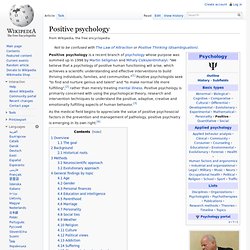
Positive psychology is a recent branch of psychology whose purpose was summed up in 1998 by Martin Seligman and Mihaly Csikszentmihalyi: "We believe that a psychology of positive human functioning will arise, which achieves a scientific understanding and effective interventions to build thriving individuals, families, and communities. "[1] Positive psychologists seek "to find and nurture genius and talent" and "to make normal life more fulfilling",[2] rather than merely treating mental illness. Depression and the Limits of Psychiatry. The Stone is a forum for contemporary philosophers and other thinkers on issues both timely and timeless.
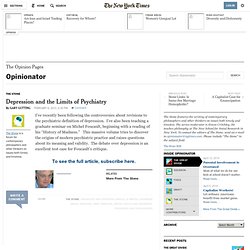
I’ve recently been following the controversies about revisions to the psychiatric definition of depression. I’ve also been teaching a graduate seminar on Michel Foucault, beginning with a reading of his “History of Madness.” This massive volume tries to discover the origins of modern psychiatric practice and raises questions about its meaning and validity. The debate over depression is an excellent test case for Foucault’s critique.
Embattled childhoods may be the real trauma for soldiers with PTSD. New research on posttraumatic stress disorder (PTSD) in soldiers challenges popular assumptions about the origins and trajectory of PTSD, providing evidence that traumatic experiences in childhood -- not combat -- may predict which soldiers develop the disorder.
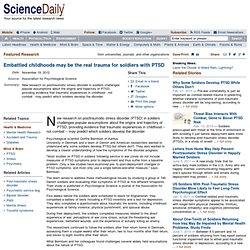
Psychological scientist Dorthe Berntsen of Aarhus University in Denmark and a team of Danish and American researchers wanted to understand why some soldiers develop PTSD but others don't. They also wanted to develop a clearer understanding of how the symptoms of the disorder progress. "Most studies on PTSD in soldiers following service in war zones do not include measures of PTSD symptoms prior to deployment and thus suffer from a baseline problem. On the Edge. On June 12, 2004, my brother Eric was admitted to the emergency room at Mass.

General Hospital, unconscious after what appeared to be a failed suicide attempt. Scientists Afflict Computers with Schizophrenia to Better Understand the Human Brain. May 5, 2011 AUSTIN, Texas — Computer networks that can't forget fast enough can show symptoms of a kind of virtual schizophrenia, giving researchers further clues to the inner workings of schizophrenic brains, researchers at The University of Texas at Austin and Yale University have found.
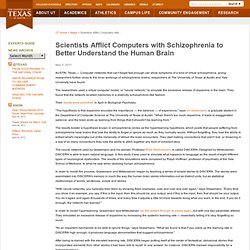
The researchers used a virtual computer model, or "neural network," to simulate the excessive release of dopamine in the brain. They found that the network recalled memories in a distinctly schizophrenic-like fashion. Their results were published in April in Biological Psychiatry. "The hypothesis is that dopamine encodes the importance — the salience — of experience," says Uli Grasemann, a graduate student in the Department of Computer Science at The University of Texas at Austin. The neural network used by Grasemann and his adviser, Professor Risto Miikkulainen, is called DISCERN. In order to model the process, Grasemann and Miikkulainen began by teaching a series of simple stories to DISCERN.
Depression can damage the brain. Depression can cause some areas of the brain to shrink – and the damage can last, even when the disease has stopped.
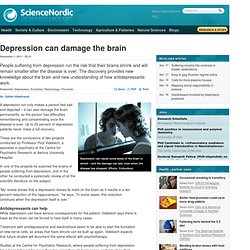
(Photo: Colourbox) A depression not only makes a person feel sad and dejected – it can also damage the brain permanently, so the person has difficulties remembering and concentrating once the disease is over. Up to 20 percent of depression patients never make a full recovery. These are the conclusions of two projects conducted by Professor Poul Videbech, a specialist in psychiatry at the Centre for Psychiatric Research at Aarhus University Hospital. Depression is predictable. A vulnerability gene combined with a stressful event can trigger clinical depression.
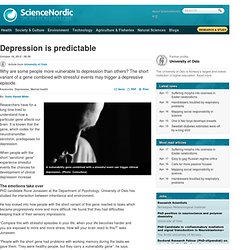
(Photo: Colourbox) Researchers have for a long time tried to understand how a particular gene affects our brain. It is known that the gene, which codes for the neurotransmitter serotonin, predisposes for depression. When people with the short “serotonin gene” experience stressful events the chances for development of clinical depression increase. The emotions take over. Ketamine Relieves Depression By Restoring Brain Connections : Shots - Health Blog. Stress-coping strategies can save teens from becoming suicidal. 40 percent of youth who attempt suicide have tried more than once..
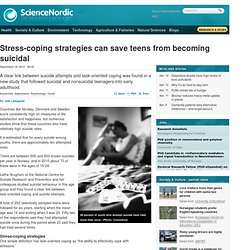
(Photo: Colourbox) Countries like Norway, Denmark and Sweden score consistently high on measures of life satisfaction and happiness, but numerous studies show that these countries also have relatively high suicide rates. It is estimated that for every suicide among youths, there are approximately ten attempted ones. Update: Thomas Szasz, Manlius psychiatrist who disputed existence of mental illness, dies at 92. Gary Walts / File photoDr. Thomas Szasz speaks at the 2001 commencement for Upstate Medical University, where he received an honorary doctor of science degree. Szasz, who died Saturday, was a psychiatrist known internationally for disputing the existence of mental illness. Manlius, NY – Dr. Thomas S. Szasz, a psychiatrist who questioned the existence of mental illness and fought against the forced treatment of patients, died Saturday at his home in Manlius. Dysthymia. According to the diagnosis manual DSM-IV of 1994, dysthymia is a serious state of chronic depression, which persists for at least 2 years (1 year for children and adolescents); it is less acute and severe than major depressive disorder.[4] As dysthymia is a chronic disorder, sufferers may experience symptoms for many years before it is diagnosed, if diagnosis occurs at all.
As a result, they may believe that depression is a part of their character, so they may not even discuss their symptoms with doctors, family members, or friends. Dysthymia often co-occurs with other mental disorders. Blocking the voices in your head. In the autumn of 2010, Josef Johann Bless was listening to music on his iPhone when he was suddenly had an idea. "I was listening to a number of instruments, and as the sounds of the instruments were distributed differently to each ear, it struck me that this was very similar to the dichotic listening tests we routinely use in our laboratory," says Bless, who is a PhD candidate at University of Bergen's Faculty of Psychology and a member of the Bergen fMRI Group. "In dichotic listening, each ear is presented with different syllable sounds, and the listener must identify which syllable seems clearest".
Inspired by what he was hearing, Bless set about thinking how he could put his observation to good use. The idea he came up with was cunning in its simplicity, and very modern: an iPhone app called iDichotic.